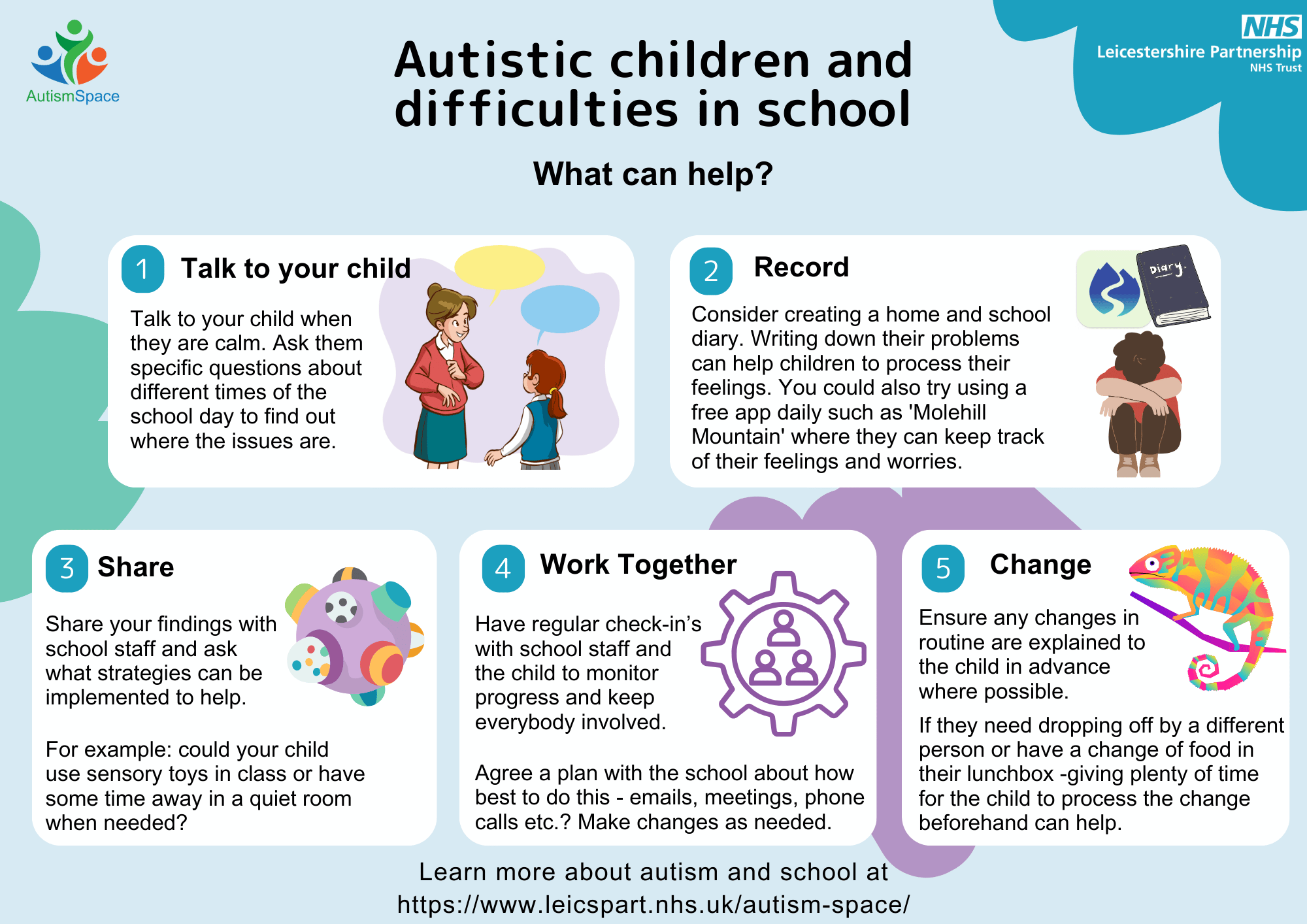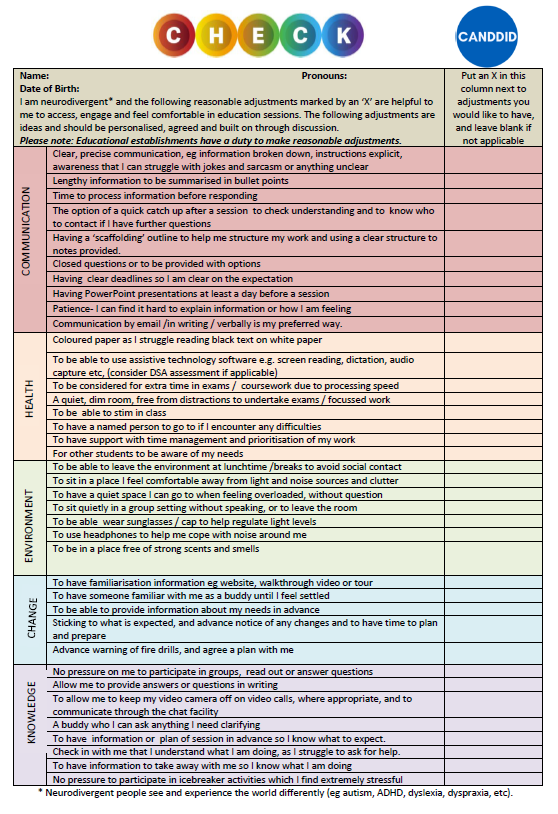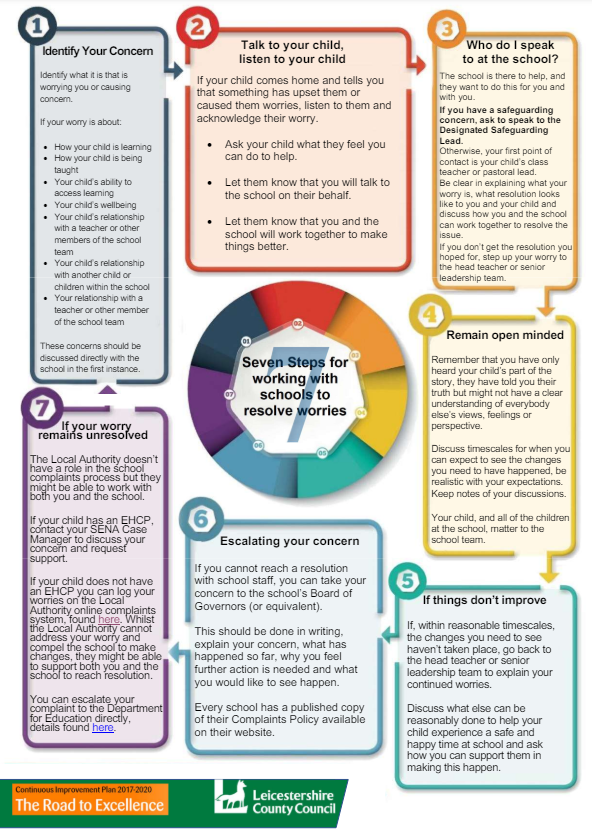What you can do to help
- You, your child and their school need to be fully aware of your child’s strengths, difficulties and needs
- To get the right sort of support in place, you all need to communicate with each other and work together
- You need to keep checking with each other about how this is going – so any necessary changes can be made
- You need to make sure your child’s opinion is listened to and considered when any decisions are made about how to best support them
Click this link to view or download and accessible pdf version of this picture
If you can, talk to your child about school and ask about:
- What they enjoy
- What they are good at
- What they dislike
- What they find difficult
- What causes them stress
- What sort of things help them overcome difficulties
- What sort of things make problems worse
For all these questions, also ask WHY they feel this way about each of these things.
Make sure to ask these questions about all their different lessons, social times and environments (e.g. playground, dinner hall, corridors, changing rooms, PE, break time, lunch time).
Telling school staff about your child’s strengths, difficulties and needs
You may wish to provide any new teachers with an ‘About Me’ document that explains all of the above about your child.
Reframing Autism have made an excellent downloadable template and offer some ideas on what to include.
Click here to find this downloadable template.
Cheshire and Wirral NHS Trust have made a checklist designed to help make education settings more comfortable and accessible for neurodivergent people.
The checklist focuses on five main areas:
- Communication
- Health
- Environment
- Change
- Knowledge
Click here to view and download the checklist.
You, your child and school staff should work together to create a support plan.
Consider the following:
- Ask what school staff see as strengths and difficulties in your child
- Ask what they think helps and does not help your child – not just with learning but also with feeling comfortable and safe
- From here, agree how you and school will support your child
- Discuss accommodations. These are every day changes that could be made to help your child have the same learning opportunities as most other children
- Accommodations should consider how to reduce sensory and social stressors – as well as adaptations for specifically supporting learning. For example, this could include being given a visual timetable, print outs of lesson content, permission to eat lunch in a quiet space, or to sit in a preferred space in class
- Discuss access arrangements – these are adjustments made for exams – for children with different learning needs, disabilities (or a temporary injury). They may include extra time, a quiet room, a scribe, using a computer instead of writing. (Access arrangements vary for everyone who is entitled to them. Schools will need to carry out certain tests to work out what access arrangements your child might be entitled to.)
- Make sure school are aware of your child’s strengths and interests. Discuss what opportunities and encouragement they can be given to engage in these – as this can help reduce stress, build confidence and enhance your child’s learning
- Ask how needs, accommodations and strengths will be communicated with all staff. Options include an Individual Education Plan (IEP) – which tends to be written by school staff – or a Student Passport, which could have input from your child. Either way, you could ask to have a copy
- Ask if your child can have a mentor (trusted adult) to talk to on a regular basis to discuss any problems try to work out solutions – or to talk about and encourage special interests
If you continue to have an issue with school meeting the needs of your Autistic child, you should contact the school for a copy of the complaint’s procedure.
Leicestershire County Council have devised a flow chart for working with schools to resolve difficulties:
Click here to view or download the flow chart.
If you are still not satisfied with the outcome, then Ofsted or the Department of Education.
Additional support to consider and discuss with school:
If a school is finding it difficult to meet your child’s learning needs, they can apply for an Education Health and Care Plan. This legal document is usually called an EHCP. Applications will usually only be considered if school have tried making reasonable adjustments and your child is still struggling – and if school do not have further resources (e.g. people or equipment) to try anything more specialised.
Link to our article on EHCP’s in detail
Parents/carers can also consider applying instead of school.
Those living in Leicester City, can do so via the Leicester City Council website by clicking here
For those living in Leicestershire and Rutland area, you can find more information by clicking here
Waiting lists and application processes for EHCPs can be very long, and you are not guaranteed to be successful.
Click here to find out more about EHCPs and how to get help in schools/colleges. You can also contact SENDIASS for advice on 0116 4820870.
If a school/college in Leicestershire is struggling to know how to best support a young autistic person, they can make a referral to the Autism Outreach Team (Leicestershire County Council).
Click here for more information on this service.
If a school/college in Leicester City is struggling to know how to best support a young autistic person, they can make a referral to the Learning, Communication and Interaction team (Leicester City Council).
Click here for more information on this service.
Other things to consider when communicating with school:
- The best person to talk to is usually the Special Educational Needs Co-ordinator (SENCo) – as they are the person responsible for ensuring different learning needs are met
- For primary school children, it is useful and often easy to speak to their class teacher
- It can be hard to get hold of secondary school teachers for conversations. You may find it easier to email
- Even if you do manage to speak to school staff directly, you may wish to document any important information in a follow up email. This can help as a reminder for yourself and act as evidence, just in case agreed actions are not followed up
- For primary school children particularly, a ‘home-school communication book’ can be a great way to share information between teachers and parents/carers on a regular, ongoing basis
- If there are several issues to discuss, you may need to ask for a meeting
- For any face-to-face discussion, if your child agrees, make sure they are present – as it is their voice, above all others, that needs to be heard
- If your child does not wish to attend – make sure you ask them what they would like you to say or ask on their behalf
- Bear in mind that most autistic children will need you to be clear and honest with them. So, to keep their trust, it is usually best to agree with your autistic child on what and how you will communicate with school – and keep them informed of any updates
- Finally, make sure your child is aware of and agrees to any support strategies before school implement them. Don’t assume what they need or want. For example, you might think they need to sit near the front and have some 1:1 support – but this may draw unwanted attention that is too stressful for them
For links to all our school related articles, click on the link below:





